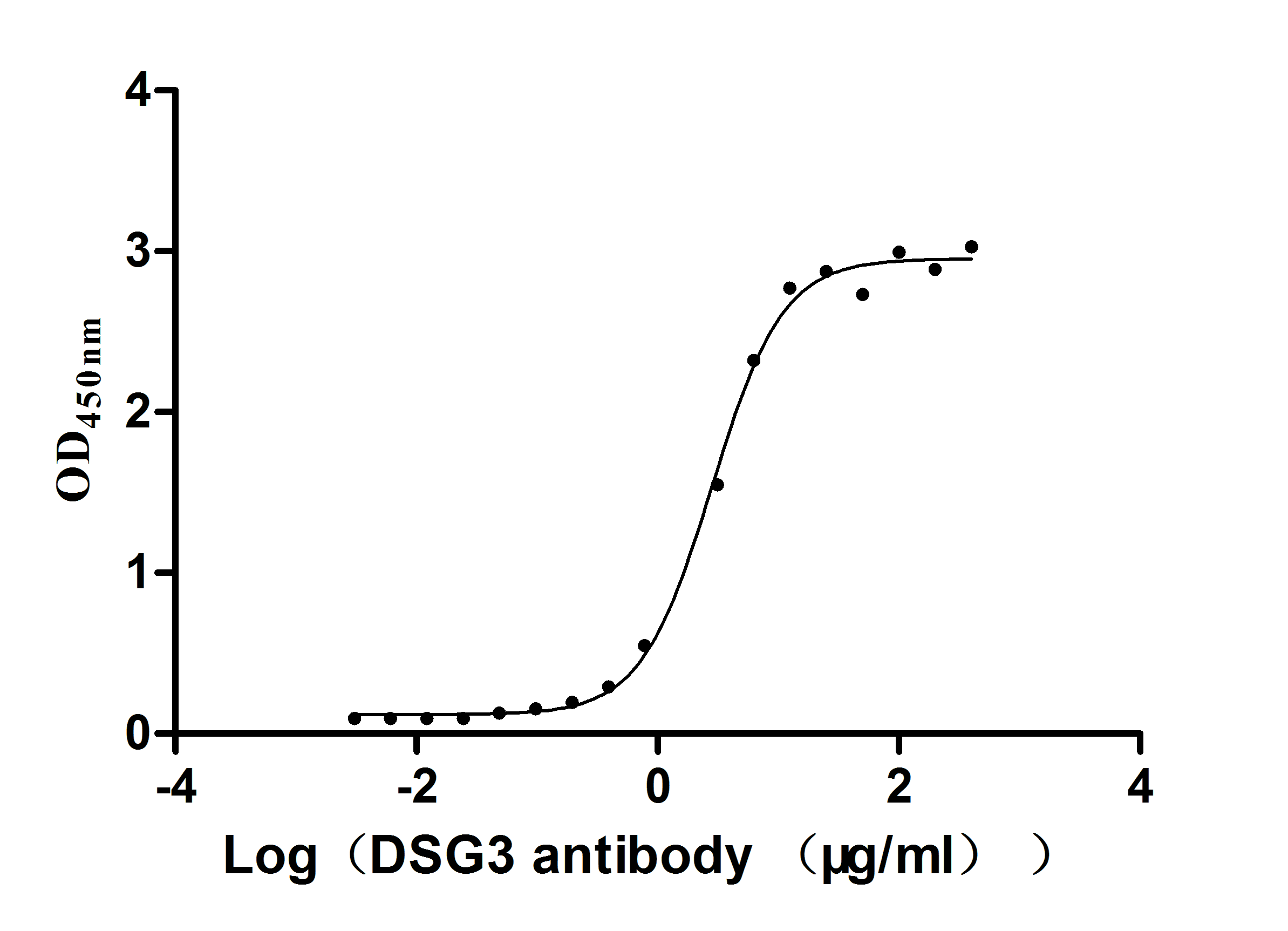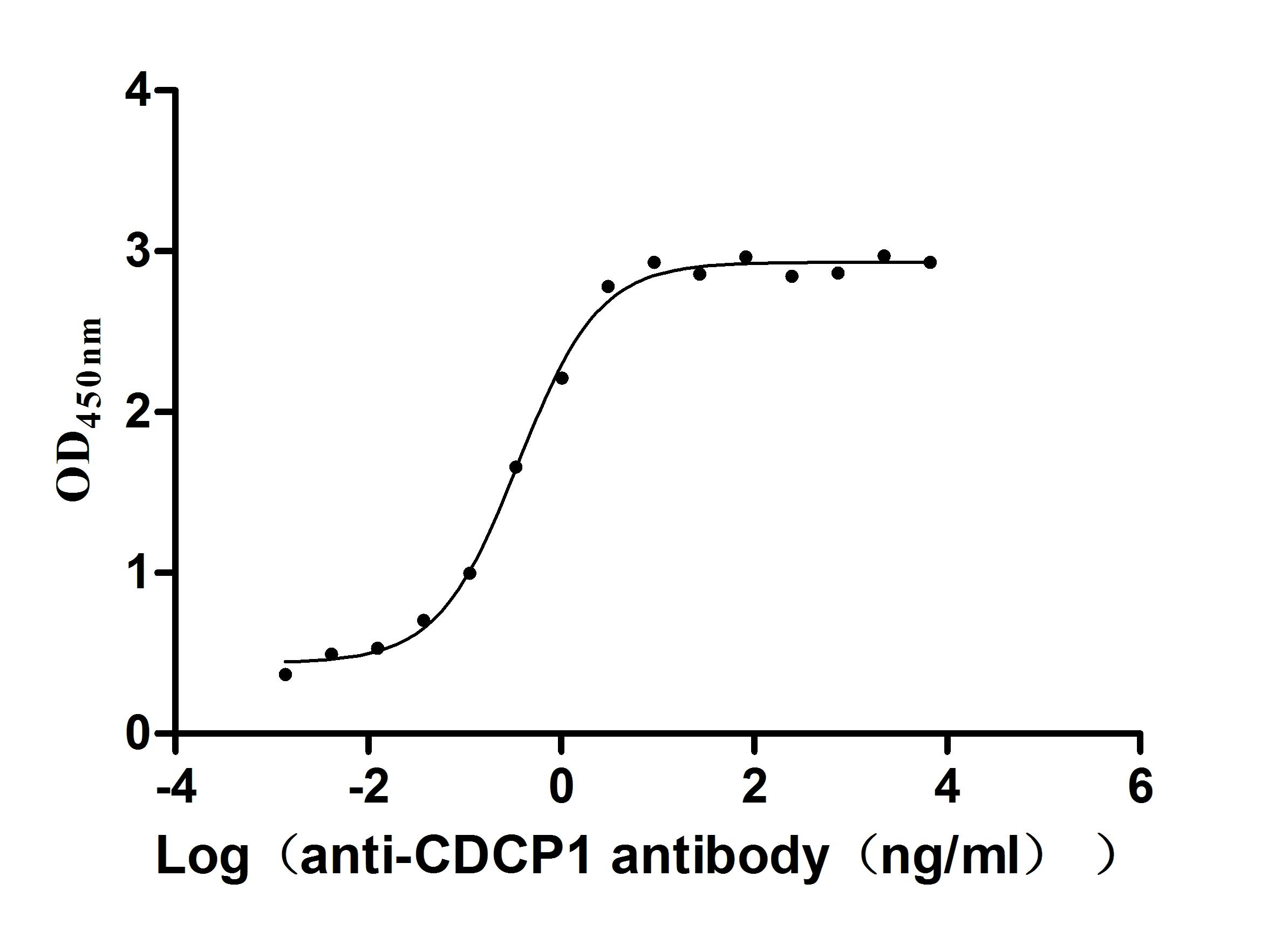Recombinant Rat Histamine H3 receptor (Hrh3), partial
-
中文名称:大鼠Hrh3重组蛋白
-
货号:CSB-YP886187RA1
-
规格:
-
来源:Yeast
-
其他:
-
中文名称:大鼠Hrh3重组蛋白
-
货号:CSB-EP886187RA1
-
规格:
-
来源:E.coli
-
其他:
-
中文名称:大鼠Hrh3重组蛋白
-
货号:CSB-EP886187RA1-B
-
规格:
-
来源:E.coli
-
共轭:Avi-tag Biotinylated
E. coli biotin ligase (BirA) is highly specific in covalently attaching biotin to the 15 amino acid AviTag peptide. This recombinant protein was biotinylated in vivo by AviTag-BirA technology, which method is BriA catalyzes amide linkage between the biotin and the specific lysine of the AviTag.
-
其他:
-
中文名称:大鼠Hrh3重组蛋白
-
货号:CSB-BP886187RA1
-
规格:
-
来源:Baculovirus
-
其他:
-
中文名称:大鼠Hrh3重组蛋白
-
货号:CSB-MP886187RA1
-
规格:
-
来源:Mammalian cell
-
其他:
产品详情
-
纯度:>85% (SDS-PAGE)
-
基因名:
-
Uniprot No.:
-
别名:Hrh3; Histamine H3 receptor; H3R; HH3R
-
种属:Rattus norvegicus (Rat)
-
蛋白长度:Partial
-
蛋白标签:Tag type will be determined during the manufacturing process.
The tag type will be determined during production process. If you have specified tag type, please tell us and we will develop the specified tag preferentially. -
产品提供形式:Lyophilized powder
Note: We will preferentially ship the format that we have in stock, however, if you have any special requirement for the format, please remark your requirement when placing the order, we will prepare according to your demand. -
复溶:We recommend that this vial be briefly centrifuged prior to opening to bring the contents to the bottom. Please reconstitute protein in deionized sterile water to a concentration of 0.1-1.0 mg/mL.We recommend to add 5-50% of glycerol (final concentration) and aliquot for long-term storage at -20℃/-80℃. Our default final concentration of glycerol is 50%. Customers could use it as reference.
-
储存条件:Store at -20°C/-80°C upon receipt, aliquoting is necessary for mutiple use. Avoid repeated freeze-thaw cycles.
-
保质期:The shelf life is related to many factors, storage state, buffer ingredients, storage temperature and the stability of the protein itself.
Generally, the shelf life of liquid form is 6 months at -20°C/-80°C. The shelf life of lyophilized form is 12 months at -20°C/-80°C. -
货期:Delivery time may differ from different purchasing way or location, please kindly consult your local distributors for specific delivery time.Note: All of our proteins are default shipped with normal blue ice packs, if you request to ship with dry ice, please communicate with us in advance and extra fees will be charged.
-
注意事项:Repeated freezing and thawing is not recommended. Store working aliquots at 4°C for up to one week.
-
Datasheet :Please contact us to get it.
相关产品
靶点详情
-
功能:The H3 subclass of histamine receptors could mediate the histamine signals in CNS and peripheral nervous system. Signals through the inhibition of adenylate cyclase and displays high constitutive activity (spontaneous activity in the absence of agonist).
-
基因功能参考文献:
- indicate that histamine H1, H2, and H3 receptors are present in rat olfactory epithelium and may play a physiological role in olfactory transmission. PMID: 28964277
- Results indicate that in rat nucleus accumbens H3Rs do not modulate dopamine uptake or release, but regulate dopamine synthesis by inhibiting cAMP formation and thus PKA activation PMID: 26169221
- These data support the hypothesis that H3R could also mediate non-neuronal histamine effects, suggesting its involvement in fluid homeostasis PMID: 25745947
- H3 and H4 receptors in endothelial cells are potentially important for regulation of blood-brain barrier permeability, including trafficking of immunocompetent cells PMID: 23488566
- This study confirmed the ability of cultured astrocytes from different rat brain regions to express histamine H3 receptors. PMID: 24432407
- results indicate that co-stimulation of post-synaptic D1 and H3 receptors may indirectly regulate basal dopamine release in the rat striatum and provide in vivo evidence for a functional interaction between D1 and H3 receptors in the basal ganglia PMID: 23896530
- ZEL-H16 is a novel and potent nonimidazole agonist of H3R, which might serve as a pharmacological tool for future investigations or as possible therapeutic agent of H3R. PMID: 22870296
- Finsings show that short, but not long, isoforms fulfill the function of autoreceptor and thereby confirm the hypothesis that H3 receptor isoforms have distinct functional roles in the brain PMID: 22356432
- histamine released from degranulated unstainable mast cells induces a transient increase in presynaptic autoinhibitory HRH3 immunoreactivity and mRNA expression as a mechanism to counteract histamine neurotoxicity PMID: 22277566
- Data suggest that brain histamine H(3) receptors, and especially those expressed in the prefrontal cortex, play an important role in the autoregulation of histamine neurotransmission. PMID: 22050612
- the histamine H(3) receptor is involved in the protection against gastric lesions in the rat stomach following administration of concentrated HCl PMID: 21839070
- the involvement of histamine H(3) receptors in the neurotransmission of perivascular adrenergic and CGRPergic nerves PMID: 21272571
- D(1)-H(3) receptor heteromers work as processors integrating dopamine- and histamine-related signals involved in controlling the function of striatal neurons of the direct striatal pathway. PMID: 21173143
- The aim of this work was to investigate the effects of essential splice signals on intron retention in histamine H3 receptors and to identify sequence elements that determine the differences in splicing between rats and mice. PMID: 19446035
- Inhibition of depolarization-stimulated histamine synthesis by the histamine H(3) receptor agonist imetit was impaired by preincubation with pertussis toxin. PMID: 15465923
- In rat thalamus, histamine H(1) receptor and isoforms of H(3) receptor were expressed predominantly in the midline and intralaminar areas PMID: 15899242
- oligomers of native hrh3 in rat forebrain membranes PMID: 15928831
- H(3) receptor mRNA expression increased in caudate putamen of postischemic brain but decreased in globus pallidus and thalamus. Binding was increased in cortex, caudate-putamen, globus pallidus, and hippocampus. PMID: 16181737
- Histaminergic neurons protect the developing hippocampus from KA-induced neuronal damage, with regulation of neuronal survival being at least partly mediated through H3 receptors. PMID: 16436594
- Taken together our results indicate that agonist binding promotes the down-regulation of striatal H3 receptors resulting in a significant loss of function. PMID: 16715497
- Processing of proprioceptive information at the level of the mesencephalic trigeminal neurons is controlled via histamine H1 and H3 receptors through different postsynaptic mechanisms. PMID: 16797837
- H3 receptor density in cortical tissue of SHR animals increases with age. PMID: 17531160
- The purpose of this study was to identify the structural requirements for H3 antagonistic activity via quantitative structure-activity relationship (QSAR) studies and receptor modeling/docking techniques. PMID: 17561422
- Data describe the influence of (R)-alpha-methylhistamine on the histamine H3 receptor in the rat gastrointestinal tract. PMID: 17806162
- H3 receptors play an important role in regulation of hippocampal theta oscillation, representing one of the probable mechanisms involved in histamine-induced modulation of higher brain functions, such as attention and learning. PMID: 17940197
- These data suggest that [18F]fluoroproxyfan can be potentially useful to image histamine H3 receptor noninvasively in the human brain by positron emission tomography. PMID: 17998102
- Data show that histamine H3 and H4 receptors are expressed on distinct endocrine cell types in the rat fundic mucosa. PMID: 18345490
- H(3)R is localized mainly around submucosal glands and plays an important role in the secretion of submucosal glands in the nose. PMID: 18564330
- This is the first evidence that histaminergic neurons are organized into functionally distinct circuits that influence different brain regions, and display selective control mechanisms. PMID: 19490084
显示更多
收起更多
-
亚细胞定位:Cell membrane; Multi-pass membrane protein.
-
蛋白家族:G-protein coupled receptor 1 family
-
组织特异性:Expressed abundantly in brain, most notably throughout the thalamus, the ventromedial hypothalamus and the caudate nucleus. Isoform 1 is largely predominant in all tissues.
-
数据库链接:
KEGG: rno:85268
UniGene: Rn.7617
Most popular with customers
-
Recombinant Mouse Desmoglein-3 (Dsg3), partial (Active)
Express system: Mammalian cell
Species: Mus musculus (Mouse)
-
Recombinant Rat Intestinal-type alkaline phosphatase 1 (Alpi) (Active)
Express system: Mammalian cell
Species: Rattus norvegicus (Rat)
-
Recombinant Human CUB domain-containing protein 1 (CDCP1), partial (Active)
Express system: Mammalian cell
Species: Homo sapiens (Human)
-
Recombinant Human Tumor necrosis factor ligand superfamily member 15(TNFSF15) (Active)
Express system: Mammalian cell
Species: Homo sapiens (Human)





-AC1.jpg)










